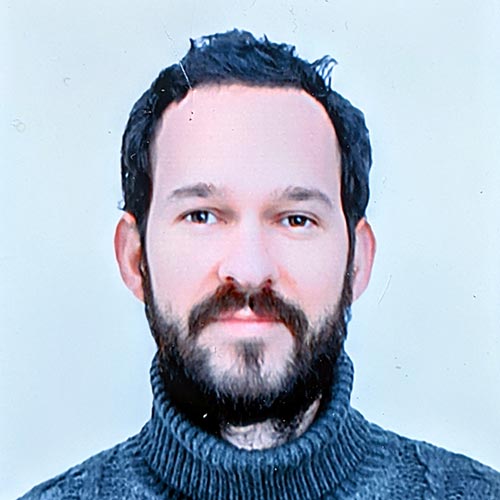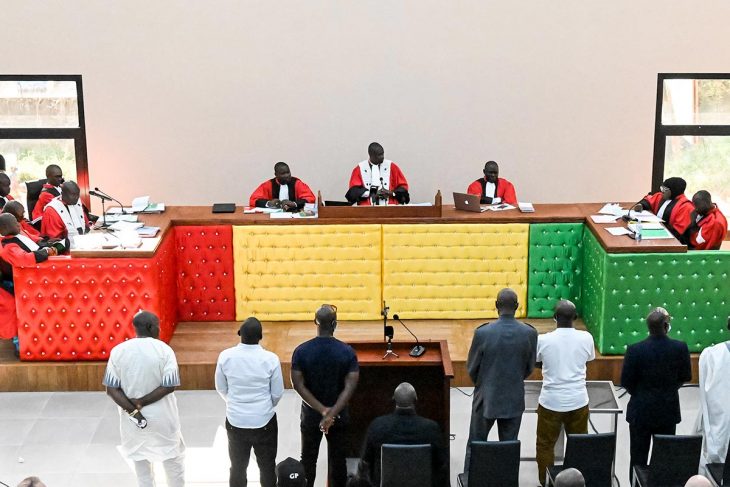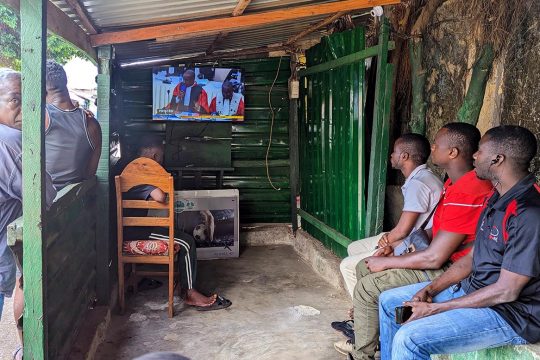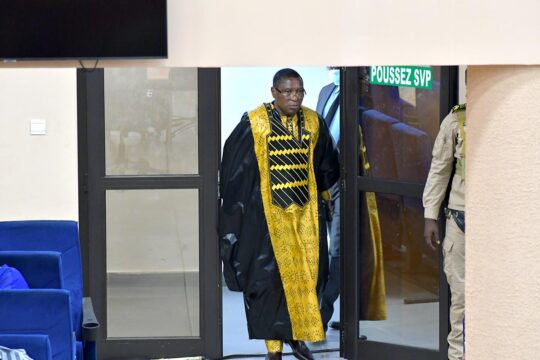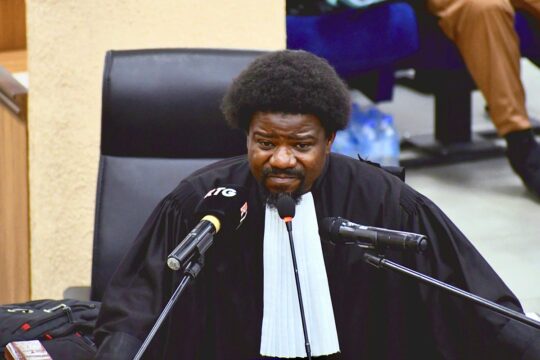On November 23, 2022, the court president issued a call to order: "For the actors in this trial, that is, the prosecution, defence and civil parties, the court informs you that it will not accept certain remarks, especially ethnic or regionalist." Shortly before the hearing opened, he warned, "If anyone ventures onto that ground, the court will be obliged to have them expelled."
Ibrahima Sory II Tounkara’s tone was firm. While there have been many references to ethnicity during the debates, the judge wants to avoid the parties linking it any more to the crimes he is responsible for judging: in 2009, at the Conakry stadium, a clampdown on an opposition gathering left at least 156 people dead and many injured, including more than a hundred women who were raped.
Moustapha Diop, a socio-anthropologist who heads the social sciences faculty at Lansana Conté University, notes that, with a few exceptions, "the various parties and the defence itself, are constituted along ethnic lines”. Thus, the lawyers for the civil parties are mostly Peuhl, while those for the defendants are from the Forest region.
"It is a reality of this country"
Moussa Dadis Camara, former head of the junta in power at the time of the massacre and the most prominent of the 11 defendants on trial, was born in Koulé and is still very popular in his native region of Forest Guinea in the southeast of the country. When he took power in 2008 in a coup, Camara became the first "Forest" president in Guinea's history.
In this trial, we are seeing "the hostage-taking of political power by ethnicity", says Zaïnoul Traoré, a socio-anthropologist and teacher at Lansana Conté University. In Guinea, he says, "whoever holds power always rules through ethnicity, it is a reality of this country”.
And for Diop, the fact that this ethnic dimension is mentioned in the trial is certainly not a surprise. "It is a fundamental issue that cannot be ignored,” he says. “It has become a challenge for peace and social cohesion in Guinea.”
However, some Guineans who have been following the trial are concerned. "This poses a great risk to the Guinean population. This is not good. The judges must try to make a good final decision so that there are no disputes among the people," warned Albert Ntela, a young man from the TV viewing corner of Camayenne district in Conakry.
“It’s a very sensitive issue and difficult to admit," stresses the academic. "It is the political use of ethnicity which sometimes creates divisions" and this is done by pretenders to power who "are perhaps not able to propose a project that brings society together".
Victims mostly Peuhl
A Human Rights Watch report released on December 17, 2009 traces the killings. The document, based on 240 testimonies, mentions racist insults and threats made by security officers. For example, “a woman who was raped by several members of the Presidential Guard reported that her attackers regularly referred to her ethnicity: 'Today we're going to teach you a lesson. Yes, we've had enough of your tricks...we're going to exterminate all the Peuhl’". The Peuhl would have been seen as an obstacle to a junta whose power was consolidated around another community.
In Guinea, "political power is linked to ethnic group, so when the chief appoints people from his ethnic group or region, these people are determined to hang on to power”, says Professor Traoré. "They will say that the power is theirs, it’s their regime. That can lead to abuses.”
Human Rights Watch notes that Dadis Camara and other military leaders such as Captain Claude Pivi [also in the dock] were members of Forest minorities. “Many (but not all) soldiers of the newly formed Presidential Guard were from ethnic groups in the Forest region," says the report. “Militiamen in civilian clothes, armed with knives and machetes, were seen in and around the stadium, and, according to witnesses, the majority of them were from ethnic groups in the Forest region.” These fighters may have been trained, the report continues, at the Kaleah camp near Forécariah in southwest Guinea, where the junta reportedly began building "an ethnic militia" in the summer of 2009.
The report says that of the victims interviewed, 20 were from the Peuhl ethnic group, five were Malinké, two Soussou and one Wolof. But it says "most of the victims thought they had been attacked at random and the fact that a majority of them were Peuhl could be explained by the disproportionate presence of people from this ethnic group at the opposition rally”. Within the Forces Vives, the coalition that organized the September 28, 2009 rally at Conakry stadium, one of the main parties - Cellou Dalein Diallo's UFDG - has a majority of Peuhl in its ranks. On September 28, 2009, they were protesting the possible candidacy of Moussa Dadis Camara for presidential elections scheduled in January 2010.
President of Guinean Bar stops the session
On October 25, Aboubacar Sidiki Diakité, a former aide-de-camp to Dadis Camara known as known as "Toumba", was questioned in court by counsel for the civil parties:
- Tell me, officer, what was the criterion used for recruits to join Kaléah [military camp]? What were the conditions?
- In Kaléah, the only criterion was community. You had to be Guerzé, that's all. If you are Kissi or Toma, then no [Guerzé, Kissi and Toma are ethnic groups in Forest Guinea].
On the stand, Toumba said he wanted to heal the wounds of his country and work for "national reconciliation”. But the lawyers for his co-accused did not like what he said. They are trying to dismantle the thesis that the government was ethnically oriented. "Do you think that if the President was ethnocentric, he would have taken drivers who were not from his ethnic group?” one of them asked.
The lawyers tried to turn the tables:
- I would like to know why you call Guerze a patois. Aren't you discrediting a community through its language? asked another.
- I don't want division among Guineans
- Mr. Diakité, don't you hate Mr. Dadis and his community?
Toumba, who is not a Forestier, defended himself, saying he didn’t consider the term "patois" pejorative and applied it to all the local languages of Guinea.
On October 26, these exchanges provoked a suspension of the session at the request of the Guinean Bar Association president, who was at the hearing and said he had "deemed it necessary to intervene". "There were comments made in the courtroom that were not in the interest of national unity. With this kind of talk, there could have been quite unfortunate incidents in the public," Djibril Kouyaté explained to Radio France International (RFI).
Then it was the turn to testify of Toumba's former bodyguard, Raphaël Cécé Haba, who said he had been assigned to him to "monitor his actions and report back" to Dadis Camara. Shortly after Toumba tried to assassinate Dadis Camara on December 3, 2009, Cécé said he was abandoned by the Forestiers. "Everyone thinks that I betrayed [my community], that I joined Toumba to spoil the power of the Forest. My wife is rejected today in our neighbourhood. All my family have distanced themselves from my wife."
"An opportunity to dig into this issue"
While issues related to ethnicity cannot be ignored in this trial, the court is doing everything it can to "stick to the facts", says Traore. "It is to be commended. At every opportunity, the young president makes sure we steer away from ethnic discourse. In Guinea, this requires great efforts. But this is necessary if we are going to achieve a common identity for our nation.” Two months into the trial, Diop also sees an opportunity for Guinea: "This is an opportunity to dig into this ethnic issue, to show it in all its aspects and to move beyond it."

